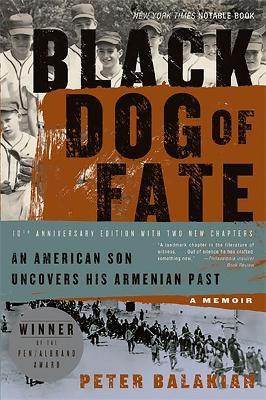Black Dog of Fate

Black Dog of Fate
His visions are burning -- his poetry heartbreaking, wrote Elie Wiesel of American poet Peter Balakian. Now, in elegant prose, the prize-winning poet who James Dickey called an extraordinary talent has written a compelling memoir about growing up American in a family that was haunted by a past too fraught with terror to be spoken of openly. Black Dog of Fate is set in the affluent New Jersey suburbs where Balakian -- the firstborn son of his generation -- grew up in a close, extended family. At the center of what was a quintessential American baby boom childhood lay the dark specter of a trauma his forebears had experienced -- the Ottoman Turkish government's extermination of more than a million Armenians in 1915, the century's first genocide. In a story that climaxes to powerful personal and moral revelations, Balakian traces the complex process of discovering the facts of his people's history and the horrifying aftermath of the Turkish government's campaign to cover up one of the worst crimes ever committed against humanity. In describing his awakening to the facts of history, Balakian introduces us to a remarkable family of matriarchs and merchants, physicians, a bishop, and his aunts, two well-known figures in the world of literature. The unforgettable central figure of the story is Balakian's grandmother, a survivor and widow of the Genocide who speaks in fragments of metaphor and myth as she cooks up Armenian delicacies, plays the stock market, and keeps track of the baseball stats of her beloved Yankees. The book is infused with the intense and often comic collision between this family's ancient Near Eastern traditions and the American pop culture of the '50s and '60s.Balakian moves with ease from childhood memory, to history, to his ancestors' lives, to the story of a poet's coming of age. Written with power and grace, Black Dog of Fate unfolds like a tapestry its tale of survival against enormous odds. Through the eyes of a poet, here is the arresting story of a family's journey from its haunted past to a new life in a new world.
PRP: 123.94 Lei
Acesta este Prețul Recomandat de Producător. Prețul de vânzare al produsului este afișat mai jos.
111.55Lei
111.55Lei
123.94 LeiIndisponibil
Descrierea produsului
His visions are burning -- his poetry heartbreaking, wrote Elie Wiesel of American poet Peter Balakian. Now, in elegant prose, the prize-winning poet who James Dickey called an extraordinary talent has written a compelling memoir about growing up American in a family that was haunted by a past too fraught with terror to be spoken of openly. Black Dog of Fate is set in the affluent New Jersey suburbs where Balakian -- the firstborn son of his generation -- grew up in a close, extended family. At the center of what was a quintessential American baby boom childhood lay the dark specter of a trauma his forebears had experienced -- the Ottoman Turkish government's extermination of more than a million Armenians in 1915, the century's first genocide. In a story that climaxes to powerful personal and moral revelations, Balakian traces the complex process of discovering the facts of his people's history and the horrifying aftermath of the Turkish government's campaign to cover up one of the worst crimes ever committed against humanity. In describing his awakening to the facts of history, Balakian introduces us to a remarkable family of matriarchs and merchants, physicians, a bishop, and his aunts, two well-known figures in the world of literature. The unforgettable central figure of the story is Balakian's grandmother, a survivor and widow of the Genocide who speaks in fragments of metaphor and myth as she cooks up Armenian delicacies, plays the stock market, and keeps track of the baseball stats of her beloved Yankees. The book is infused with the intense and often comic collision between this family's ancient Near Eastern traditions and the American pop culture of the '50s and '60s.Balakian moves with ease from childhood memory, to history, to his ancestors' lives, to the story of a poet's coming of age. Written with power and grace, Black Dog of Fate unfolds like a tapestry its tale of survival against enormous odds. Through the eyes of a poet, here is the arresting story of a family's journey from its haunted past to a new life in a new world.
Detaliile produsului













